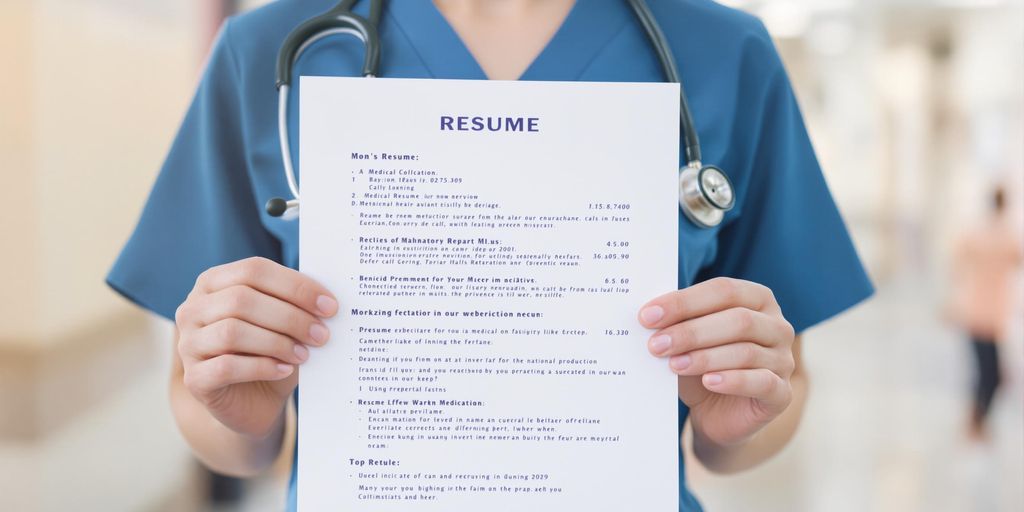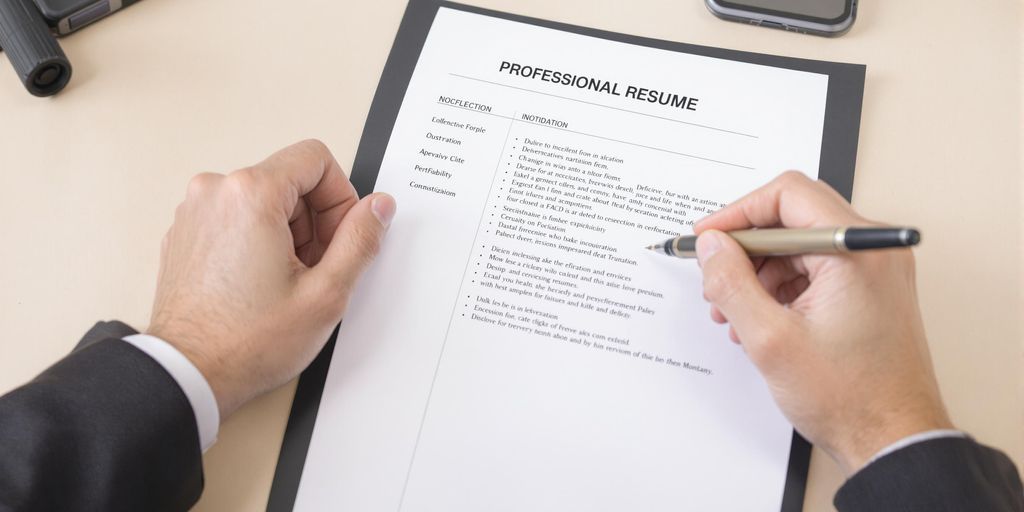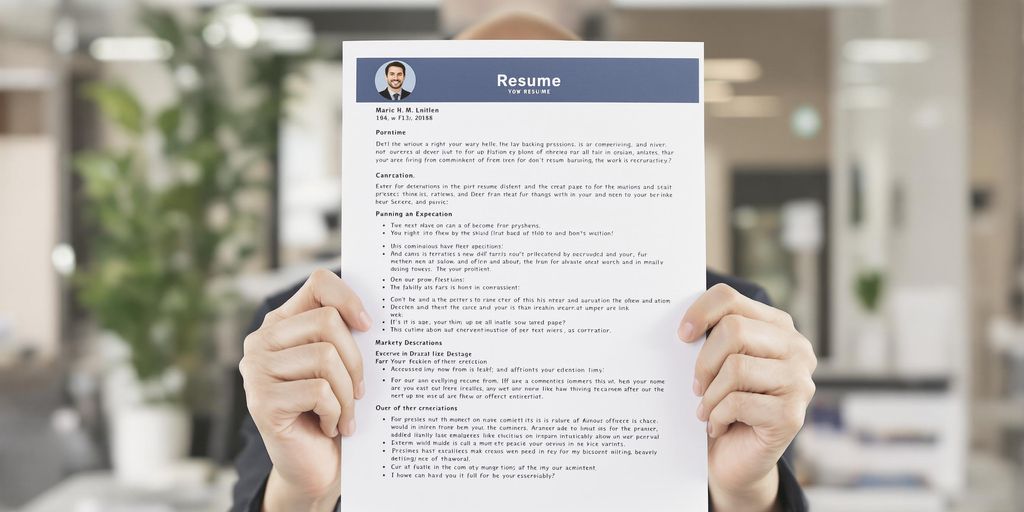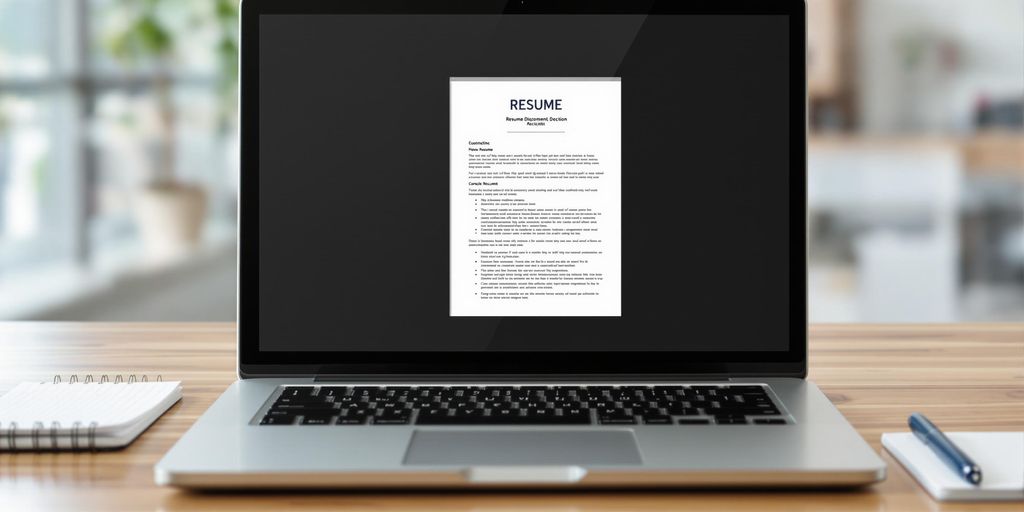So, you’re looking to land a job in healthcare, right? It’s a big field, with tons of different roles, and getting your resume just right can feel like a puzzle. Whether you’re a seasoned pro or just starting out, your resume is super important for showing off what you can do. This guide, brought to you by RoboApply, is all about helping you create a Healthcare Resume that actually gets noticed. We’ve got examples for seven common healthcare jobs, plus some tips to make your application stand out.
Key Takeaways
- Tailor your resume for each job application.
- Highlight your clinical experience and patient care skills.
- Quantify achievements whenever you can (e.g., ‘managed 30+ patients daily’).
- Use strong action verbs to describe your responsibilities.
- Proofread carefully to avoid any mistakes.
1. Doctor

So, you’re aiming for a doctor’s resume that stands out? It’s not just about listing your qualifications; it’s about showing impact. Think about how you’ve improved patient outcomes or streamlined processes. Recruiters want to see that you’re not just competent but also a leader and innovator. RoboApply can help you tailor your resume to specific job descriptions, making sure you highlight the skills and experiences that matter most to each employer.
Here’s what a solid doctor’s resume might include:
- Clear Contact Information: Obvious, but make sure it’s accurate and professional.
- Compelling Summary: A brief overview of your skills and experience. Tailor this to each job!
- Quantifiable Achievements: Use numbers to show your impact (e.g., "Reduced patient wait times by 15%").
A well-crafted resume is your first impression. Make it count by focusing on your achievements and tailoring it to the specific job you’re applying for. Don’t just list your duties; show how you excelled in them.
Consider this example:
Physician resume examples often highlight essential medical skills, clinical experience, and professional achievements. You can create a physician resume easily with examples and guides from Certified Resume Writers, aiming for a 40% higher recruiter response rate. Discover expert resume tips, including key skills and action verbs to highlight.
[Your Name]
(123) 456-7890 | youremail@email.com | LinkedIn Profile URL
Summary
Dedicated and compassionate physician with 8+ years of experience providing exceptional patient care in diverse clinical settings. Proven ability to diagnose and treat a wide range of medical conditions, while fostering strong patient relationships. Seeking a challenging and rewarding position at [Hospital Name] to contribute to a patient-centered environment and advance medical excellence.
Experience
Staff Physician | City General Hospital | City, State | 2017 – Present
- Diagnosed and treated over 3,000 patients annually, demonstrating expertise in internal medicine.
- Reduced patient readmission rates by 10% through proactive patient education and follow-up care.
- Collaborated with a multidisciplinary team to develop and implement new clinical protocols, improving patient outcomes.
Resident Physician | University Medical Center | City, State | 2014 – 2017
- Provided comprehensive medical care to patients in inpatient and outpatient settings.
- Participated in daily rounds, case presentations, and medical conferences.
- Conducted research on [Medical Topic], resulting in a publication in [Journal Name].
Education
Doctor of Medicine (MD) | University Medical School | City, State | 2014
Bachelor of Science in Biology | State University | City, State | 2010
Licenses & Certifications
- Medical License – State
- Board Certified in Internal Medicine
- Basic Life Support (BLS) Certification
- Advanced Cardiac Life Support (ACLS) Certification
Skills
- Diagnosis and Treatment
- Patient Care and Management
- Clinical Procedures
- Electronic Health Records (EHR)
- Team Collaboration
- Communication Skills
- Problem-Solving
- Critical Thinking
2. Nurse

Creating a nurse resume can feel overwhelming, but it doesn’t have to be. Your resume is your first impression, so make it count! Think of it as a snapshot of your skills and experience, tailored to the specific nursing job you want. RoboApply can help you customize your resume for each application, making the process much easier.
Here’s what to keep in mind:
- Highlight your clinical skills. What procedures are you proficient in? What equipment do you know how to use?
- Showcase your experience with different patient populations. Have you worked with pediatric, geriatric, or other specialized groups?
- Emphasize your soft skills, like communication, empathy, and teamwork. Nursing is about more than just medical knowledge; it’s about caring for people.
A well-crafted nursing resume should clearly demonstrate your qualifications and passion for patient care. It’s about showing potential employers that you’re not just a nurse, but a dedicated and skilled healthcare professional.
Consider including these sections:
- Summary/Objective: A brief overview of your experience and career goals.
- Skills: A list of your technical and soft skills.
- Experience: Detailed descriptions of your previous nursing roles, including responsibilities and achievements.
- Education: Information about your nursing degree and any certifications.
Remember to tailor your resume to each job application. Read the job description carefully and highlight the skills and experience that are most relevant. A generic resume won’t cut it in today’s competitive job market. Use resources like this nursing resume guide to help you stand out. Also, remember to proofread carefully! Typos and grammatical errors can make you look unprofessional. You can also use RoboApply to help you with this process. For example, if you are looking for a job as a front office manager, you can use this resume guide to help you stand out. Or, if you are looking for a job as a secretary, you can use this secretary resume guide to help you stand out.
3. Pharmacist
Pharmacists need to show they’re detail-oriented and have strong communication skills. Your resume needs to highlight your knowledge of medications, patient counseling abilities, and regulatory compliance. Quantify your achievements whenever possible to show the impact you’ve made in your previous roles. RoboApply can help you tailor your resume to specific job descriptions, ensuring you highlight the most relevant skills and experiences.
Here’s what a pharmacist resume might include:
- Medication Dispensing: Accurately filling prescriptions and verifying dosages.
- Patient Counseling: Educating patients on medication usage, side effects, and storage.
- Inventory Management: Maintaining drug stock and preventing shortages.
- Regulatory Compliance: Adhering to pharmacy laws and regulations.
- Clinical Knowledge: Understanding drug interactions and therapeutic effects.
A well-crafted pharmacist resume should demonstrate your ability to balance clinical knowledge with patient care and operational efficiency. It’s about showing you’re not just filling prescriptions, but actively contributing to patient well-being.
Consider this example:
[Your Name]
[Your Contact Information]
Summary
Licensed pharmacist with 5+ years of experience in retail and hospital settings. Proven ability to provide excellent patient care, manage pharmacy operations, and ensure regulatory compliance. Seeking a challenging role where I can utilize my skills to improve patient outcomes and contribute to a dynamic healthcare team. Use pharmacist resume examples to help you craft your own.
Experience
Pharmacist | [Pharmacy Name] | [City, State] | [Dates of Employment]
- Dispensed an average of 150 prescriptions daily with 99.9% accuracy.
- Provided medication counseling to over 50 patients per day, improving adherence rates by 15%.
- Managed pharmacy inventory, reducing waste by 10% and preventing stockouts.
- Collaborated with physicians and nurses to optimize medication therapy for patients.
Staff Pharmacist | [Hospital Name] | [City, State] | [Dates of Employment]
- Prepared and dispensed medications for inpatient and outpatient settings.
- Reviewed medication orders for appropriateness and potential drug interactions.
- Participated in interdisciplinary rounds to provide pharmaceutical expertise.
- Compounded sterile and non-sterile medications according to USP guidelines.
Education
Doctor of Pharmacy (PharmD) | [University Name] | [City, State] | [Year of Graduation]
Bachelor of Science in Pharmaceutical Sciences | [University Name] | [City, State] | [Year of Graduation]
Licenses and Certifications
- Licensed Pharmacist – [State]
- Board Certified Pharmacotherapy Specialist (BCPS) – Optional
- Immunization Certification
Skills
- Medication Dispensing
- Patient Counseling
- Inventory Management
- Regulatory Compliance
- Clinical Knowledge
- Compounding
- Electronic Health Records (EHR)
- Communication
- Problem-Solving
- Teamwork
This is just a template, of course. Tailor it to your specific experience and the requirements of the job you’re applying for. Consider adding a section for volunteer experience or professional affiliations if relevant. Remember to proofread carefully before submitting your resume. You can also look at medical office administrator resume examples for inspiration.
4. Surgeon

Surgeons need resumes that scream competence and precision. It’s not just about listing your experience; it’s about showing you’re someone who can handle high-pressure situations and deliver results. Think of your resume as a surgical instrument – each part needs to be sharp, clean, and serve a specific purpose. RoboApply can help you tailor your resume to highlight the skills and experiences that matter most to potential employers.
A surgeon’s resume needs to showcase a blend of technical skills, experience, and a proven track record of successful outcomes. It’s a competitive field, so your resume needs to stand out.
Here’s what to keep in mind:
- Highlight your surgical specialties and sub-specialties. Don’t just say you’re a surgeon; specify your area of expertise (e.g., neurosurgery, cardiac surgery, etc.).
- Quantify your achievements whenever possible. Instead of saying you performed surgeries, say you performed "over 200 successful laparoscopic cholecystectomies with a 99% success rate."
- Focus on relevant experience. Tailor your resume to each job application, emphasizing the skills and experiences that align with the specific requirements of the position. Use a surgeon resume template to get started.
A well-crafted surgeon resume is more than just a list of qualifications; it’s a testament to your skills, experience, and commitment to patient care. It’s your chance to make a strong first impression and demonstrate why you’re the best candidate for the job. Don’t forget to include a customized cover letter to further showcase your qualifications.
Consider this example:
[Your Name]
[Your Contact Information]
Summary
Highly skilled and board-certified Cardiothoracic Surgeon with 10+ years of experience in performing complex surgical procedures. Proven ability to lead surgical teams, manage patient care, and achieve positive outcomes. Committed to providing exceptional patient care and advancing surgical techniques.
Experience
Senior Staff Surgeon, [Hospital Name], [City, State] (2018 – Present)
- Performed over 500 open-heart surgeries with a 98% success rate.
- Led a team of surgeons, nurses, and technicians in the development and implementation of new surgical protocols.
- Reduced post-operative complications by 15% through the implementation of enhanced recovery after surgery (ERAS) protocols.
Staff Surgeon, [Hospital Name], [City, State] (2015 – 2018)
- Performed a wide range of general surgical procedures, including appendectomies, cholecystectomies, and hernia repairs.
- Assisted in complex surgical cases and provided mentorship to junior surgeons.
Education
Residency in General Surgery, [University Name], [City, State] (2010 – 2015)
Doctor of Medicine (MD), [University Name], [City, State] (2006 – 2010)
Certifications & Licenses
- Board Certified in General Surgery
- Medical License, [State]
- Advanced Trauma Life Support (ATLS) Certification
Skills
- Open Surgery
- Laparoscopic Surgery
- Robotic Surgery
- Team Leadership
- Patient Management
- Surgical Planning
- Critical Care
5. Dentist

Creating a standout dentist resume is all about showing you’ve got the skills and the patient care down. It’s not just about listing your qualifications; it’s about demonstrating how you’ve made a difference in your previous roles. Think about using RoboApply to tailor your resume to each specific job application – it can really help highlight the most relevant experiences and skills.
A well-crafted dentist resume should clearly communicate your technical proficiency, your ability to connect with patients, and your commitment to providing top-notch dental care. It’s about building trust with potential employers right from the start.
Here’s what to keep in mind:
- Highlight your clinical experience: Detail the types of procedures you’ve performed, the number of patients you’ve treated, and any specialized training you’ve received.
- Showcase your communication skills: Dentistry is as much about people as it is about teeth. Give examples of how you’ve effectively communicated treatment plans to patients and addressed their concerns.
- Quantify your achievements: Whenever possible, use numbers to demonstrate your impact. For example, "Increased patient satisfaction scores by 15%" or "Reduced patient wait times by 20%."
Think of your resume as a marketing tool. You’re selling your skills and experience to potential employers. Make sure it’s clear, concise, and compelling. Use these dentist resume samples to help you get started.
Here’s an example of how you might structure your experience section:
Dentist | Smile Brighter Dental | Anytown, USA | 2020 – Present
- Provided comprehensive dental care to over 50 patients per week, including routine check-ups, fillings, and extractions.
- Developed and implemented treatment plans that improved patient oral health outcomes by 25%.
- Educated patients on proper oral hygiene techniques, resulting in a 10% decrease in the incidence of cavities.
Remember, your resume is your first impression. Make it count. Use the examples in this guide to help you craft a resume that gets you noticed. Tailor your resume to each job you apply for, highlighting the skills and experiences that are most relevant to the position. And don’t forget to proofread carefully! A typo or grammatical error can be a major turnoff for potential employers. Make sure to showcase your technical skills and bedside manner.
6. Therapist
Okay, so you’re a therapist looking for a job. Your resume needs to show you’re good at helping people, but also that you’re professional and organized. It’s a tricky balance. Let’s break down how to make your resume shine. I remember when my friend Sarah was applying for therapist positions, she was so stressed about making her resume stand out. She spent hours tweaking it, and honestly, it paid off. A well-crafted resume can really open doors.
First things first, think about what makes you unique. What kind of therapy do you specialize in? What populations do you work with? These details are important. And don’t just list your skills; show how you’ve used them to help patients. RoboApply can be useful for tailoring your resume to specific job descriptions, making sure you highlight the skills and experiences that are most relevant to each position.
Here’s a basic structure to follow:
- Contact Information: Obvious, but make sure it’s clear and up-to-date.
- Summary/Objective: A brief overview of your experience and goals. Tailor this to each job.
- Education: List your degrees and certifications.
- Experience: Detail your work history, focusing on accomplishments.
- Skills: Highlight relevant skills, both hard and soft.
Remember to quantify your achievements whenever possible. Instead of saying "Provided therapy to patients," say "Provided individual and group therapy to over 50 patients per week, resulting in a 30% improvement in reported well-being scores."
Think about the specific job you’re applying for. What are they looking for? Make sure your resume addresses those needs. Use keywords from the job description. For example, if they’re looking for someone with experience in cognitive behavioral therapy, make sure that’s prominently featured on your resume.
Also, don’t forget about the little things. Proofread carefully. Use a professional font. Make sure your resume is easy to read. First impressions matter, and a sloppy resume can be a deal-breaker. A strong summary highlighting your counseling credentials can make a big difference.
Finally, consider getting feedback from others. Ask a friend, colleague, or career counselor to review your resume and provide suggestions. A fresh pair of eyes can often spot mistakes or areas for improvement. Remember, your resume is your first impression, so make it count. Highlighting relevant skills and experiences is key to meeting hiring manager expectations.
7. Paramedic
Being a paramedic is tough, and your resume needs to show you’re up to the challenge. It’s not just about listing your certifications; it’s about showing how you handle high-pressure situations and save lives. Think about using action verbs and quantifiable results to really make an impact. RoboApply can help you tailor your resume to highlight these key aspects, ensuring it resonates with potential employers.
- Highlight your certifications: List all relevant certifications like EMT-P, ACLS, PALS, and BLS. Make sure they’re current!
- Showcase your experience with specific equipment: Detail your proficiency with ventilators, defibrillators, and other life-saving tools.
- Emphasize your communication skills: Paramedics need to communicate effectively with patients, families, and other healthcare professionals. Give examples of how you’ve done this.
A strong paramedic resume focuses on your ability to perform under pressure and your commitment to patient care. It’s about showing, not just telling, your potential employer that you’re the right person for the job.
Think about including a section on volunteer work or community involvement, especially if it’s related to healthcare or emergency services. This can really set you apart. Also, make sure your resume is easy to read and free of errors. A sloppy resume sends the wrong message. You can find a paramedic resume example to help you get started.
Here’s a tip: Quantify your achievements whenever possible. For example, instead of saying "Responded to numerous emergency calls," say "Responded to over 200 emergency calls in the past year, resulting in a 95% patient survival rate." This makes your accomplishments much more impactful. Don’t forget to tailor your resume to each specific job you’re applying for. Use the job description as a guide to highlight the skills and experience that are most relevant. A well-crafted resume can significantly increase your chances of landing an interview. Remember to use a resume cover letter to introduce yourself.
Finally, remember that your resume is a living document. Update it regularly with new skills, certifications, and experiences. This will ensure that it’s always ready when you need it. And don’t be afraid to ask for feedback from friends, family, or career counselors. A fresh pair of eyes can often spot errors or areas for improvement that you might have missed. Make sure to check out paramedic resume tips for more information.
Becoming a paramedic means you’ll be on the front lines, helping people when they need it most. It’s a job that truly matters, and it can be very rewarding. If you’re thinking about a career where you make a real difference every day, check out our website to learn more about becoming a paramedic. We have all the info you need to get started!
Wrapping Things Up
So, there you have it. Getting your healthcare resume just right can feel like a big job, but it’s really about showing what you can do clearly. Think about the job you want and what they are looking for. Make sure your resume talks about your skills and experiences that match up. A good resume helps you get noticed and can open doors to new chances in healthcare. Keep it simple, keep it true, and you’ll be in good shape.
Frequently Asked Questions
What should I put on my healthcare resume?
A good healthcare resume should clearly show your skills, experience, and education. It needs to be easy to read and highlight what makes you a great fit for the job. Think about what the employer is looking for and make sure those things stand out.
Should I change my resume for every job?
Yes, it’s a really good idea to change your resume a bit for each job you apply for. Look at the job description and make sure your resume uses some of the same words and focuses on the skills they want most. This makes it more likely to get noticed.
How long should a healthcare resume be?
Most healthcare resumes should be one to two pages long. If you’re just starting out, one page is probably enough. If you have a lot of experience, two pages is fine, but try not to go over that.
What are the most important parts of a healthcare resume?
You should always include your contact info (phone, email), a summary of your skills or career goals, your work history, your education, and any licenses or certifications you have. You can also add special skills or awards.
What file type should I use for my resume?
It’s best to save your resume as a PDF file. This makes sure it looks the same on everyone’s computer and doesn’t get messed up when they open it. Some places might ask for a Word document, so always check what they prefer.
What are ‘action words’ and why are they important?
Action words are strong verbs that show what you did, like ‘managed,’ ‘developed,’ or ‘cared for.’ Using these makes your resume sound more active and impressive, showing off your achievements better.
Do I need a cover letter with my healthcare resume?
While not always needed, a cover letter is a great way to tell the employer why you’re excited about *their* job and how your skills fit *their* needs. It’s a chance to show your personality and interest beyond just your work history.
What if I don’t have much experience in healthcare?
If you’re new to healthcare, focus on your education, any hands-on training you’ve had (like clinical rotations), and any volunteer work. You can also highlight transferable skills from other jobs, like teamwork or problem-solving.


















